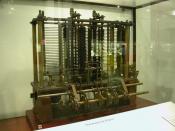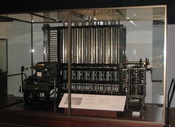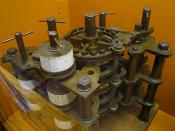The Fathers of Modern Computing
Charles Baggage and George Boole are, without question, central figures in the history of computer science. Charles] Babbage was born in Devonshire on December 26, 1791. The son of a London banker, Babbage took a great liking towards mathematics at an early age. Babbage soon became so proficient in mathematics that he was out performing his tutors at Cambridge. By 1812 Babbage co-founded the Analytical Society with the help of three other Cambridge classmates, Robert Woodhouse, Sir John Herschel, and George Peacock. In 1821 Babbage invented the Difference Engine to compile astronomical tables. While in the process of building it in 1832, he conceived a better machine that could perform not just one mathematical task but any kind of calculation. This machine was the Analytical Engine and it possessed some the characteristics of today's computers. George Boole, born November 2, 1815, was a British mathematician and founder of mathematical logic.
Coming from a poor family of limited means, Boole was essentially a self-taught mathematician. In 1847 Boole published "Mathematical Analysis of Logic". In the book, Boole established that logic could be represented by algebraic equations. This conception eventually become known as Boolean algebra and the basis of all modern digital computers. The inventions and achievements of Charles Babbage and George Boole are both directly and indirectly responsible for the conception of modern computing as we know it today.
Charles Babbage's difference and analytic machines were not only sophisticated arithmetic machines, but barometers of the changing times as well. Early Victorian London was a very divided city. South of the Thames were workshops of machinists who created "automatic tools and accurate design," in west London lay the "wardens of scientific reason (Shaffer, 152)", the Astronomical Society, the Royal Society, and the Royal Institution. Northward are...


